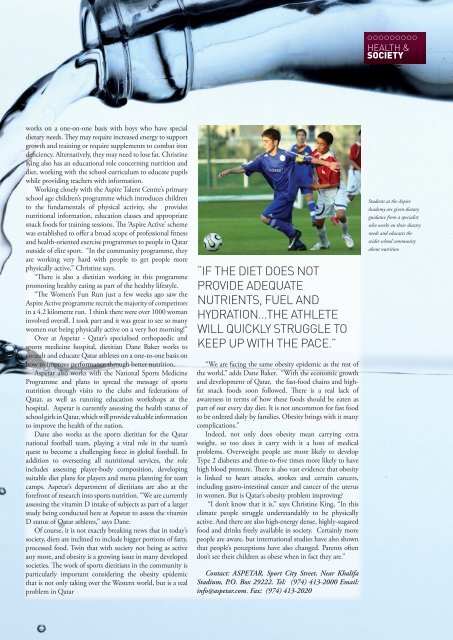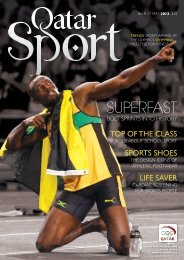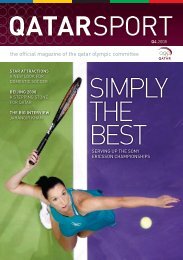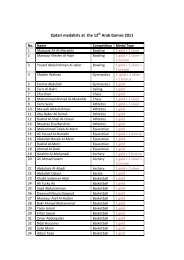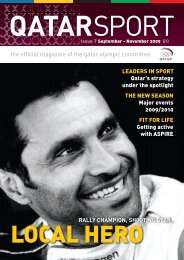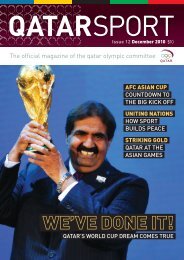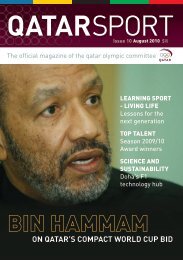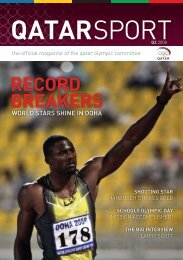NEWS - Qatar Olympic Committee
NEWS - Qatar Olympic Committee
NEWS - Qatar Olympic Committee
You also want an ePaper? Increase the reach of your titles
YUMPU automatically turns print PDFs into web optimized ePapers that Google loves.
o o o o o o o o o<br />
HEALTH &<br />
SOCIETY<br />
works on a one-on-one basis with boys who have special<br />
dietary needs. They may require increased energy to support<br />
growth and training or require supplements to combat iron<br />
deficiency. Alternatively, they may need to lose fat. Christine<br />
King also has an educational role concerning nutrition and<br />
diet, working with the school curriculum to educate pupils<br />
while providing teachers with information.<br />
Working closely with the Aspire Talent Centre’s primary<br />
school age children’s programme which introduces children<br />
to the fundamentals of physical activity, she provides<br />
nutritional information, education classes and appropriate<br />
snack foods for training sessions. The ‘Aspire Active’ scheme<br />
was established to offer a broad scope of professional fitness<br />
and health-oriented exercise programmes to people in <strong>Qatar</strong><br />
outside of elite sport. “In the community programme, they<br />
are working very hard with people to get people more<br />
physically active,” Christine says.<br />
“There is also a dietitian working in this programme<br />
promoting healthy eating as part of the healthy lifestyle.<br />
“The Women’s Fun Run just a few weeks ago saw the<br />
Aspire Active programme recruit the majority of competitors<br />
in a 4.2 kilometre run. I think there were over 1000 woman<br />
involved overall. I took part and it was great to see so many<br />
women out being physically active on a very hot morning!”<br />
Over at Aspetar - <strong>Qatar</strong>’s specialised orthopaedic and<br />
sports medicine hospital, dietitian Dane Baker works to<br />
consult and educate <strong>Qatar</strong> athletes on a one-to-one basis on<br />
how to improve performance through better nutrition.<br />
Aspetar also works with the National Sports Medicine<br />
Programme and plans to spread the message of sports<br />
nutrition through visits to the clubs and federations of<br />
<strong>Qatar</strong>, as well as running education workshops at the<br />
hospital. Aspetar is currently assessing the health status of<br />
school girls in <strong>Qatar</strong>, which will provide valuable information<br />
to improve the health of the nation.<br />
Dane also works as the sports dietitian for the <strong>Qatar</strong><br />
national football team, playing a vital role in the team’s<br />
quest to become a challenging force in global football. In<br />
addition to overseeing all nutritional services, the role<br />
includes assessing player-body composition, developing<br />
suitable diet plans for players and menu planning for team<br />
camps. Aspetar’s department of dietitians are also at the<br />
forefront of research into sports nutrition. “We are currently<br />
assessing the vitamin D intake of subjects as part of a larger<br />
study being conducted here at Aspetar to assess the vitamin<br />
D status of <strong>Qatar</strong> athletes,” says Dane.<br />
Of course, it is not exactly breaking news that in today’s<br />
society, diets are inclined to include bigger portions of fatty,<br />
processed food. Twin that with society not being as active<br />
any more, and obesity is a growing issue in many developed<br />
societies. The work of sports dietitians in the community is<br />
particularly important considering the obesity epidemic<br />
that is not only taking over the Western world, but is a real<br />
problem in <strong>Qatar</strong><br />
“IF THE DIET DOES NOT<br />
PROVIDE ADEQUATE<br />
NUTRIENTS, FUEL AND<br />
HYDRATION...THE ATHLETE<br />
WILL QUICKLY STRUGGLE TO<br />
KEEP UP WITH THE PACE.”<br />
“We are facing the same obesity epidemic as the rest of<br />
the world,” adds Dane Baker. “With the economic growth<br />
and development of <strong>Qatar</strong>, the fast-food chains and highfat<br />
snack foods soon followed. There is a real lack of<br />
awareness in terms of how these foods should be eaten as<br />
part of our every day diet. It is not uncommon for fast food<br />
to be ordered daily by families. Obesity brings with it many<br />
complications.”<br />
Indeed, not only does obesity mean carrying extra<br />
weight, so too does it carry with it a host of medical<br />
problems. Overweight people are more likely to develop<br />
Type 2 diabetes and three-to-five times more likely to have<br />
high blood pressure. There is also vast evidence that obesity<br />
is linked to heart attacks, strokes and certain cancers,<br />
including gastro-intestinal cancer and cancer of the uterus<br />
in women. But is <strong>Qatar</strong>’s obesity problem improving?<br />
“I don’t know that it is,” says Christine King, “In this<br />
climate people struggle understandably to be physically<br />
active. And there are also high-energy dense, highly-sugared<br />
food and drinks freely available in society. Certainly more<br />
people are aware, but international studies have also shown<br />
that people’s perceptions have also changed. Parents often<br />
don’t see their children as obese when in fact they are.”<br />
Contact: ASPETAR, Sport City Street, Near Khalifa<br />
Stadium, P.O. Box 29222. Tel: (974) 413-2000 Email:<br />
info@aspetar.com. Fax: (974) 413-2020<br />
Students at the Aspire<br />
Academy are given dietary<br />
guidance from a specialist<br />
who works on their dietary<br />
needs and educates the<br />
wider school community<br />
about nutrition


